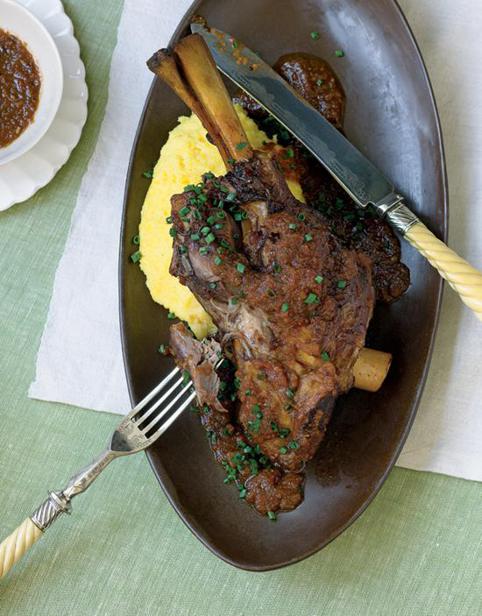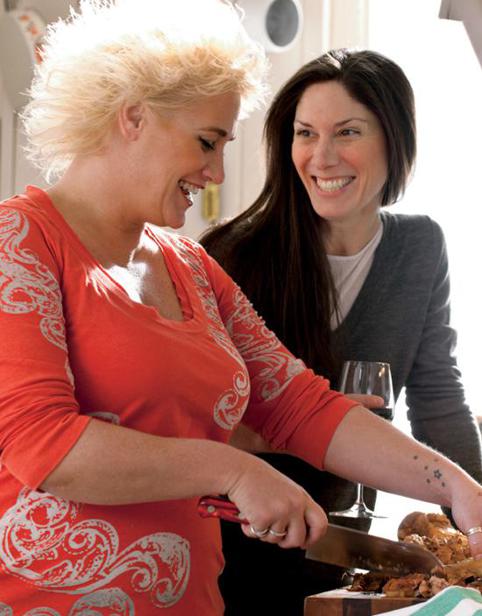Cook Like a Rock Star (32 page)
Read Cook Like a Rock Star Online
Authors: Anne Burrell

Rack of Lamb Crusted with Black Olives

SERVES: 6 • TIME: ABOUT 30 MINUTES
I’m a big fan of nice, thick lamb chops—and I’m an even bigger fan of nice, thick lamb chops deliciously browned all over! That’s exactly what you get with this recipe. Since you remove two bones from an eight-bone rack, these babies are thicker than a normal lamb chop. And, because you sear the chops on both sides—and the fat edge—before schmearing them with the lovely olive purée and finishing them in the oven, the inside stays tender and juicy, and the outside gets a beautiful, delicious, brown crust. Why is that so important? Because brown food tastes good!
MISE EN PLACE
1 cup kalamata or gaeta olives, pitted
½ bunch of fresh oregano, leaves finely chopped
1 clove garlic, smashed
Zest of 1 lemon
Pinch of crushed red pepper
Extra virgin olive oil
1 8-bone rack of lamb
Kosher salt
1
In a food processor, combine the olives, oregano, garlic, lemon zest, and red pepper. While the machine is running, drizzle in enough olive oil to create a smooth paste. Taste it—it should be olive-y and delicious!
2
Preheat the oven to 425°F.
3
Using a sharp knife and working from either end, remove the second and seventh bones from the lamb to make it a 6-rib rack; then cut 6 even chops, season them with salt, and let sit for 10 to 15 minutes.
4
Coat a large sauté pan with olive oil and bring to medium-high heat. Working in batches (if you crowd the pan the chops will steam instead of sear), add the chops and cook, turning once, until beautifully brown, 2 to 3 minutes per side. Then brown the fatty outside edge as well for another 2 minutes—SOOOOO delicious!
5
When all the chops are done, schmear them generously with the olive purée. Put the chops on a baking sheet and roast for 5 to 6 minutes for medium rare (7 to 8 for medium). Then let them rest for 4 or 5 minutes before digging in.
Lovely and lamby!
If you’re making this for a dinner party, the browning and schmearing can be done ahead of time and the chops can be tossed in the oven just before serving.

SERVES: 4 • TIME: ABOUT 3½ HOURS
I’m gonna jump right out there and say that lamb is my favorite meat. And this is probably my favorite dish—to both cook and eat. I love that lamb shanks look like something out of the
Flintstones
, even though one shank is the perfect size for one person. On a cold winter night when I’m home making dinner for my family, this is definitely my go-to recipe. Like any braise, it takes a bit of effort to get started, but once you get them going, you can just toss the shanks in the oven and let them go on their lamby way.
MISE EN PLACE
4 lamb shanks
Kosher salt
Extra virgin olive oil
2 onions, coarsely chopped
4 carrots, coarsely chopped
4 celery ribs, coarsely chopped
4 cloves garlic, smashed
1 cup tomato paste
2 cups red wine
2 tablespoons fresh rosemary, finely chopped
4 bay leaves
1 thyme bundle, tied with butcher’s twine
1
Preheat the oven to 400˚F.
2
Season the lamb generously with salt. Coat a large sauté pan with olive oil and bring to medium-high heat. Add the lamb to the pan and brown well on all sides; this may take up to 20 minutes. This is an incredibly important step—it’s where all the big brown flavors start to develop—DON’T rush it.
3
While the lamb is browning, put the onions, carrots, celery, and garlic in a food processor and purée to a coarse paste; reserve.
4
When the lamb shanks are very brown on all sides, remove them from the pan and transfer to a roasting pan. Ditch the fat, add a bit of fresh olive oil to the sauté pan, and add the puréed veggies. Season generously with salt, and cook until the veggies are very brown and a crud has formed on the bottom of the pan, 8 to 10 minutes. Scrape the crud and let it reform. Don’t rush this step.
5
Add the tomato paste and cook, stirring frequently, until it starts to brown, 1 to 2 minutes.
6
Add the wine, bring it to a boil (BTB), and stir frequently to scrape the crud from the bottom of the pan (this is the big-money flavor). Continue cooking until reduced by half, 3 to 4 minutes.
7
Add 3 to 4 cups water to the pan and stir to loosen the mixture. Taste to make sure it’s delicious and reseason if needed. It will by no means be done, but it should taste good. Pour this over the shanks in the roasting pan. The liquid should come two-thirds of the way up the shanks; if it doesn’t add more water. Toss in the rosemary, bay leaves, and thyme bundle, cover with aluminum foil, and cook in the oven for 2½ to 3 hours. Check the shanks every 45 minutes, turn them, and if the liquid has reduced significantly, add more water. When the meat is done, it will be very tender but not falling off the bone.
8
Remove the foil for the last 30 minutes of cooking time for maximum browning and to allow the liquid to reduce and thicken up. Serve with lots of sauce.
Lamb-bucco!
BROWNING AND BRAISING: Because Brown Food Tastes Good!
When I was in culinary school, I didn’t get braising; it seemed like a pain in the neck. I had to go through so many steps to get started and I just didn’t think it was worth the trouble. Now that I get it, it’s my favorite cooking technique by far. Trust me: Braising is the technique that will showcase your skill as a cook! It doesn’t matter what you’re braising—if you follow my method you will make a beautiful, brown braise every time.
First, season generously and brown your protein well—whether it’s a shank or a short rib, take your time. This is where the first big brown flavors develop and it takes patience—so don’t rush it. What’s important at this point is what’s happening in your pan, not on the clock.
Once your meat is nice and brown, remove it, ditch the fat, add a splash of fresh olive oil to the pan, add your puréed veggies, and season again. These vegetables are what we call
soffritto
and they’re the base of almost all braised dishes. Like the meat, you want to brown the crap out of the soffritto. Cook it until you see a crud start to form on the bottom of the pan, then scrape off the crud and let it form again. This is where we take things to the edge of disaster and yank them back. Food is the most flavorful one step before disaster!
After the soffritto is nice and brown, add your wine and tomato paste. Let the wine reduce by half, toss the protein back in the pan, and add enough water to cover it by about two-thirds—it should be nice and soupy. Then toss in a thyme bundle and bay leaves, bring it to a boil (BTB), reduce it to a simmer (RTS), and cook until things are nice and tender, usually a couple of hours.
Properly braised food should be very tender but still maintain its integrity and shape—it should NOT be falling off the bone. So check your braise along the way, and if the liquid level gets low, add a bit more water until the meat is perfectly tender and the sauce is super-flavorful. Follow this basic braising technique and your brown food will taste great … every time!

SERVES: 4 TO 6 • TIME: ABOUT 3½ HOURS
When I was working in Tuscany I made this dish every day. It’s a traditional osso bucco, but instead of using cross-sections, it uses the whole shank. I love it this way—big and meaty—but if you want to make these into individual portions, have the butcher cut the shanks into cross-sections for you.
Because it’s a basic braise, you get started the way you would with any braise—by browning the meat really well and then browning the veggies. The big difference here is I’ve added apples to the soffritto for a little something special. SWEET!
MISE EN PLACE
5 cloves garlic, 2 smashed and finely chopped, 3 just smashed
¼ cup finely chopped fresh rosemary
2 whole veal shanks
Kosher salt
Extra virgin olive oil

